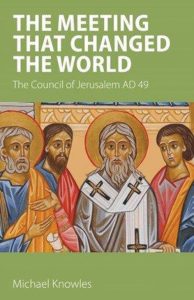Nothing More and Nothing Less
You Are Mine
Saying Yes to Life
The Diaconate in Ecumenical Perspective
 The Diaconate in Ecumenical Perspective
The Diaconate in Ecumenical Perspective
Author D. Michael Jackson (ed.)
Publisher Sacristy £19.99
Format pbk
ISBN 9781789590357
This volume resulted from a 2011 ecumenical conference on the diaconate at the University of Regina, Canada, and includes chapters on the theology of the diaconate, the transitional diaconate, women deacons, ecumenical perspectives on the diaconate, the prophetic and liturgical roles of deacons and diaconal formation. The book’s broad ecumenical range makes it unusual, with contributions from the Anglican, Roman Catholic, Ukrainian Catholic, Lutheran and Methodist traditions; in addition, authors address the diaconate in the Orthodox and Oriental Orthodox Churches. The 19 chapters are succinct, but make a compelling case for ecumenical engagement on a ministry shared between the Churches but often interpreted in very different ways. Nevertheless, a common thread running through many chapters is the importance of John Collins’ theology of diakonia as more than just service. The chapter on the survival of women deacons in the eastern Churches, in particular, illuminates an often overlooked and forgotten history. A weakness of the book, which will undoubtedly diminish its academic impact, is the regrettable absence of detailed references for most chapters, a bibliography and an analytical index.
FRANCIS YOUNG
Ecumenism, Ministry
The Meeting That Changed the World
 The Meeting That Changed the World
The Meeting That Changed the World
Author Michael Knowles
Publisher Sacristy £17.99
Format pbk
ISBN 9781789590265
The argument of this book is that the Council of Jerusalem in AD49 as outlined in Acts has been underestimated. Whatever detailed negotiations led up to its conclusions, it liberated pagan Christian converts from needing to follow the full rigours of the Torah. This traumatic but necessary step changed Christianity from being a local sect into a world-transforming faith. The author, a Roman Catholic, uses this model to challenge his own Church: if it is not prepared to ordain women and accept other similar reforms, its numbers will continue to decline. He is thus revealed as the kind of Vatican II-affirming Catholic who would be sympathetic to the present Pope. He would, of course, be strongly opposed by the neo-traditionalists in his church, some of whom are showing an odd disloyalty to that very Pope whose office they claim to venerate. Although the book is perhaps too long as it trawls through the New Testament, it offers a challenge particularly relevant in this year of Cardinal Newman’s canonisation: in the light of his Essay on the Development of Doctrine, how far can you embrace radical change while staying true to the deposit of faith?
ADRIAN ROBERTS
New Testament Analysis

Recent Comments